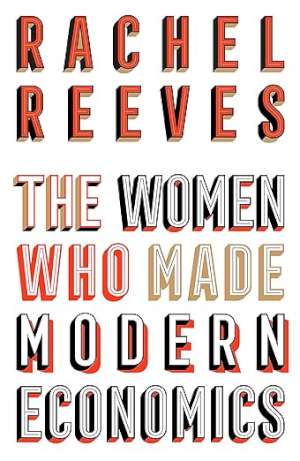21 March 2024
The Women Who Made Modern Economics
Rachel Reeves
2023, John Murray Press, 288 pages,
ISBN 9781399807449
Reviewer: Vicky Pryce

The problem with this title is that most women who have by all accounts ‘made it’ in the economics profession, rather than worrying about the criticisms about some instances of plagiarism, for which Reeves has already apologised , would instead go to the last few pages first and scour the bibliography and index to see whether their name is there – and then get sorely disappointed it isn’t. And there are probably many of us in the same boat.
Nevertheless, we must rejoice that Rachel Reeves, soon quite likely to be in the cabinet of a new UK Labour government if the polls are to be believed, chose to focus on women in economics who tend to have been – and still are – obscured by their male counterparts. And even if there and practicing their profession – something that female footballers were not able to do until they were finally recognised, as late as 1979, by the Football association – they remain in the most part unrecognised by the ‘establishment’ . Reeves is right for example to bemoan the fact that Milton Friedman’s Nobel Prize wasn’t shared with the brilliant monetary economist Anna Schwartz despite their long collaboration. And, indeed, Schwartz should have got it in her own right. And so should our own Joan Robinson have done with ‘The Economics of Imperfect Competition’ and much more. On that we are all agreed.
And this, of course, is something we see in most walks of life all too often – including in science and in the creative industries. Women’s work and contribution is often overlooked. But academic economics stands out for the scale of its inequality in treatment. Women economists in universities lag further behind their male colleagues than is the case in many other disciplines, including in the wider STEM subjects. Sadly, this seems to be happening worldwide. Co-authored economics papers result, more times than not, in the male writer rather than the woman co-author being promoted.
And on the subject of Nobel prizes, again, if you indulge me – there have only been three women receiving it since the Nobel Memorial Prize in Economic Sciences was first awarded in 1969. There have been 92 awards overall (some have been joint). This makes it 2.1% female success! Rachel Reeves understand rejoices in the Nobel Prize success of Elinor Ostrom (2009) and Esther Duflo (2019). Neither of those Nobel prizes were, of course, awarded a prize for anything directly to do with women and they were shared with others (men). But this book came out before Claudia Goldin got hers alone in late 2023 for her work on gender-based economic inequality and the ‘motherhood penalty’ that most working women experience. In this case interestingly roles were reversed. Many of Goldin’s mentors and collaborators have been men and she has worked closely with her husband, Harvard Professor, Laurence Katz.
We may therefore argue that we have come a long way. Perhaps. It’s good to see, as the book highlights, how well women have recently done in international financial institutions - maybe that is why they gravitate there. But let’s not get too excited as much still needs to change. Christine Lagarde – after French politics going to the IMF during part of the eurozone crisis, presiding over rather too austere demands on stricken countries, some would argue, and then at the ECB – is a lawyer. Her main economic adviser is a man, the previous head of the Irish Central Bank, Philip Lane. And none of the 20 central bank governors in the Eurozone who make up the ECB governing council is female. At least in the IMF now the head, Kristalina Georgieva and her number two, are women. And both are economists. Hooray! Whether the IMF has fundamentally ditched its free market principles as Reeves argues though remains unclear.
The book is particularly interesting for politics watchers when it comes to giving hints of what may happen once Labour is in power. Reeves makes clear, for example, that we won’t see her interfering with the operational independence of the Bank of England. Providing certainty and stability in policy is paramount and she credits her philosophy of “securonomics’ to the ideas coming from the work of the women economists she has covered in the book. Some of her plans for raising money and redistributing it in the ways that help women and parents and, also, those at the lower end of the income scale have of course already been pinched by the current conservative Chancellor Jeremy Hunt. More thinking therefore will be required. It won’t be easy. But Reeves’s possible elevation to that post, after the general election , would at least mean we would not only have the first-ever woman in the role but also an economist to boot!
